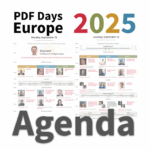Is PDF bookmark creation finally coming to Google Chrome?
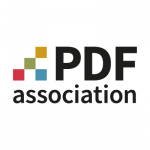
The PDF Association staff delivers a vendor-neutral platform in service of PDF’s stakeholders.


Last September our CTO wrote about the importance of bookmarks (PDF outlines) to user experience. We have recently learned that the Chrome DevTools Protocol is now exposing an experimental feature to generate a PDF Document Outline from HTML heading tags.

Although generateTaggedPDF is also flagged as EXPERIMENTAL, it's already enabled in the Google Chrome Browser when printing to “Save as PDF”. We hope the same will happen soon for generateDocumentOutline!
What does “PDF” mean to you?
Obviously, we think “PDF” should be entirely reserved for “Portable Document Format” but apparently there are other ideas, outrageous as that may seem.
Naturally, Wikipedia offers a page for PDF (disambiguation) in case you are wondering about all the other things that might be on people’s minds when they think about PDF!
Two reasons why everyone needs PDF
The business case for PDF is obvious; organizations and individuals need a totally reliable way to create, share and store every kind of document from any of a bazillion pieces of software.
So, there’s a great case for PDF as a sturdy, persistent complement to HTML.
But there are other arguments too. Some border on poetry. Others… well, they speak for themselves! We found a few…
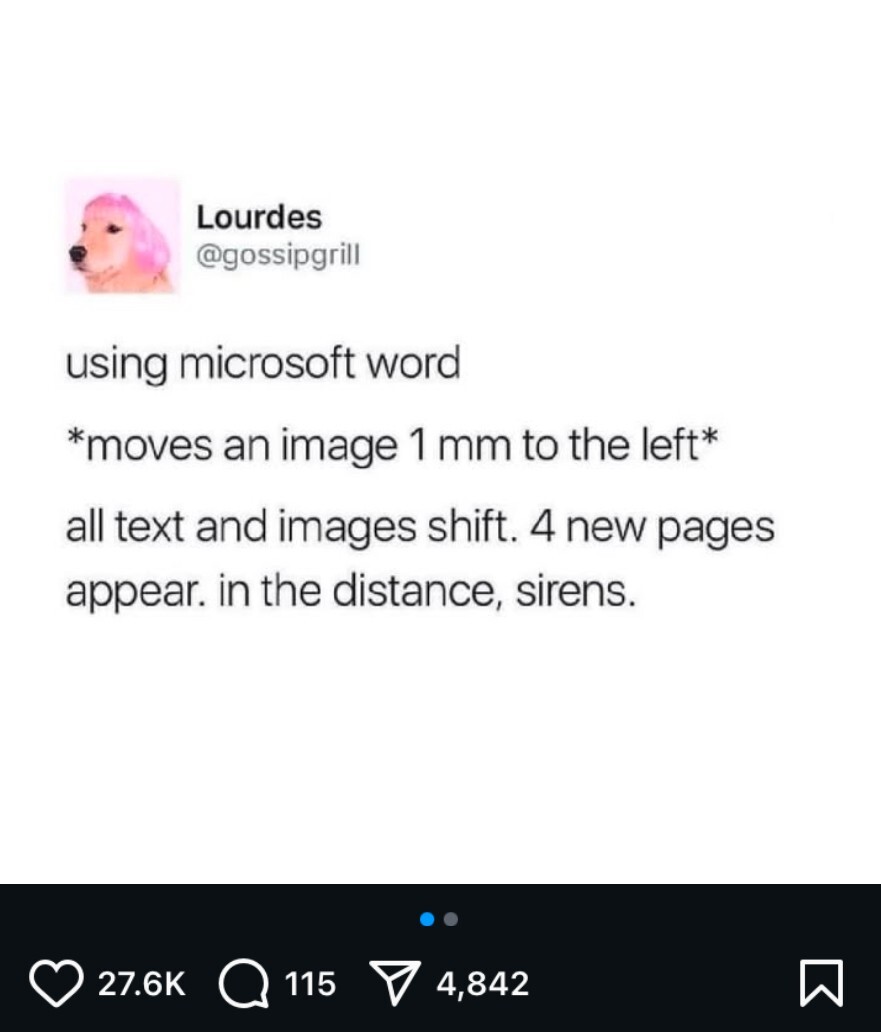

PDF tricks on YouTube
Ange Albertini (check him out on YouTube) has recently been live streaming a multi-part series about file format tricks. He’s included several videos covering PDF:
- PDF Basics (English, French)
- PDF leaks (English, French)
- PDF parasites (English, French)
- Polyglots - PNG x PDF x ZIP (English, French)
- PDF and JavaScript (English, French)
- Doom.PDF (English, French)
The full series is available in both English and French.
New free Hyperlegible™ Next Font
With seven weights in both upright and italic versions, the new Atkinson Hyperlegible™ Next font is freely available from the Braille Institute, with a focus on clear letterform distinction. Zip archives containing the OpenType files can be downloaded and installed onto any platform enabling use in authoring applications that can export PDF (ideally PDF/UA!). This PrintMag.com article explores some of the new technical design features with illustrations and animations that helps explain how the Hyperlegible font assists those with visual impairments.

Yep, you can now emulate Linux on a… PDF!
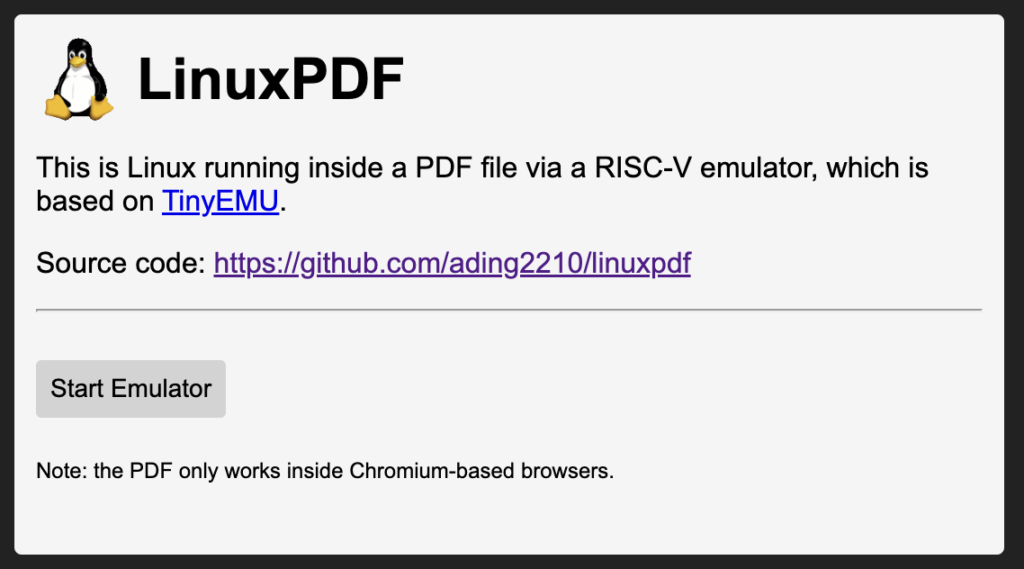 By the same trickster who brought us Doom-in-a-PDF (see last month’s “PDF in the Wild”) for Chromium browsers, we now have a fully functionally (but 100X slower than usual) Linux emulation running inside a PDF! Full source code is in GitHub and the final PDF (6MB) is also available for download.
By the same trickster who brought us Doom-in-a-PDF (see last month’s “PDF in the Wild”) for Chromium browsers, we now have a fully functionally (but 100X slower than usual) Linux emulation running inside a PDF! Full source code is in GitHub and the final PDF (6MB) is also available for download.
We’re confident that this sort of thing is ever-so-slightly outside of what Adobe was thinking of 25 years ago when they added JavaScript to PDF’s specification… 25 years ago!
Validating Well-Tagged PDF
The PDF Associations’ Well-Tagged PDF Specification (WTPDF) now has its first freely available validator with the announcement of the veraPDF 1.28 release candidate.
DPC to hold first US-based event on preservation
The Digital Preservation Coalition (DPC) has announced its first Member Forum and Networking Event in the USA, to be held at Vanderbilt University’s Special Collections and University Archives on April 24-25.
The first day of this event is open to all, and will explore practical ways to get started and make progress with digital preservation, from making the case for investment to maturity modeling and identifying the skills and activities required to carry out effective digital preservation in organizations. Day 2 is exclusively for DPC members.
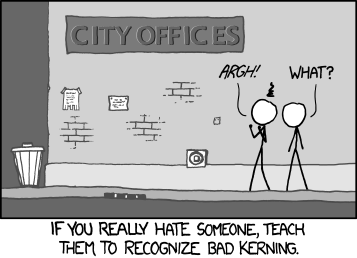
Fonts can be Fun!
For those who are interested in obtaining a deeper appreciation of what goes into the creation of typeface design while having a bit of fun, try this browser-based Letter Shaping game.
For those wanting to understand kerning (inter-character spacing adjustment), and how it can affect readability and appearance, try this browser-based Kern Type game.
PDFacademicBot for February 2025
Bernal Castano, J. et al. (January 2025) ‘Automatic Generation of PDF Accessibility Tree Using Optical Character Recognition’, Defensive Publications Series [Preprint]. https://www.tdcommons.org/dpubs_series/7772 target="_blank" rel="noopener".
Cam, N.T., Hung, T.Q. and Nam, P.T. (March 2025) ‘uitPDF-MalDe: Malicious Portable Document Format files detection using multi machine learning models’, Engineering Applications of Artificial Intelligence, 143, p. 110031. https://doi.org/10.1016/j.engappai.2025.110031 target="_blank" rel="noopener".
Castano, J.R.B. et al. (Feb. 2025) ‘Transforming Inaccessible PDF Documents into Accessible, Interactive Documents’, Technical Disclosure Commons, p. 13. https://www.tdcommons.org/cgi/viewcontent.cgi?article=9001&context=dpubs_series target="_blank" rel="noopener".
El Arrasse, M. et al. (2025) ‘Prediction of case types from non-searchable PDF documents in arabic: Comparison of machine learning and deep learning with image processing’, E3S Web of Conferences. Edited by B. Benhala et al., 601, p. 00110. https://doi.org/10.1051/e3sconf/202560100110 target="_blank" rel="noopener".
Frode Alexander Hegland (April 2024) Visual-Meta. PhD Thesis. University of Southampton. https://eprints.soton.ac.uk/497781/1/visual-meta-thesis-hegland-unsigned_1_.pdf target="_blank" rel="noopener".
Robin Rohit Vincent et al. (2025) ‘Multi-PDF GPT generative question and answering system powered by googlePalm2 and langchain’, in Data Science & Exploration in Artificial Intelligence. Google Books, p. pp.179-188. https://books.google.com.au/books?hl=en&lr=lang_en&id=JDhEEQAAQBAJ&oi=fnd&pg=PA179&dq=PDF&ots=ZnXCstJTdd&sig=V1nR7RreWWIF-DQgDDrjYH4DMaA#v=onepage&q=PDF&f=false.
Monkhouse, C. et al. (January 2025) ‘A novel phenomenon in electrogram analysis: Portable document format (PDF) printer blanking’, HeartRhythm Case Reports, 11(1), pp. 89–90. https://doi.org/10.1016/j.hrcr.2024.11.015.
Nadeem, R. et al. (Dec. 2024) ‘Extraction of User-Defined Information from PDF’, in 2024 International Conference on Decision Aid Sciences and Applications (DASA), Manama, Bahrain: IEEE, pp. 1–6. https://doi.org/10.1109/DASA63652.2024.10836169.
Peddarapu, R.K. et al. (2025) ‘Document Summarizer: A Machine Learning approach to PDF summarization’, Procedia Computer Science, 252 (4th International Conference on Evolutionary Computing and Mobile Sustainable Networks), pp. 1025–1036. https://doi.org/10.1016/j.procs.2025.01.063.
Silvano, W.F. et al. (Sept. 2024) ‘Exploring Digital Signatures Secrecy in Web-Platform: Client-Side Cryptographic Operations’, in Anais do XXIV Simpósio Brasileiro de Segurança da Informação e de Sistemas Computacionais (SBSeg 2024). Simpósio Brasileiro de Segurança da Informação e de Sistemas Computacionais, Brasil: Sociedade Brasileira de Computação - SBC, pp. 335–350. https://doi.org/10.5753/sbseg.2024.241786.
Singh, P. et al. (Nov. 2024) ‘Scientific Publication Indexing and Definition Extraction Resource’, in 2024 21st International Conference on Information Technology Based Higher Education and Training (ITHET), pp. 1–6. https://doi.org/10.1109/ITHET61869.2024.10837640.
Youhe Wang, Yi Sun, and Chuanqi Zhou (Jan. 2025) ‘Malicious Document Detection Based on GGE Visualization’, Computers, Materials and Continua, 82(1), pp. 1233–1254. https://doi.org/10.32604/cmc.2024.057710.

